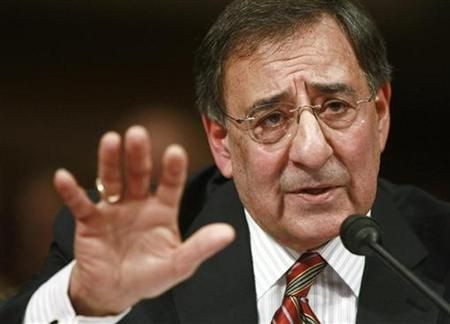Panetta Rules Out Military Action in Syria for Now

Echoing the sentiments of his boss President Barack Obama, U.S. Defense Secretary Leon Panetta has ruled out engaging in military action to remove Syrian President Bashar al-Assad during the current crisis.
Speaking to the Senate Armed Services Committee, Panetta stated: What doesn't make sense is to take unilateral action right now. I've got to make very sure we know what the mission is … achieving that mission at what price.
This terrible situation has no simple answers, Panetta added.
Army General Martin Dempsey also told the committee that military action in Syria would not be advisable in the present environment.
On Tuesday, Obama also rejected the notion of getting involved in Syria at this juncture.
For us to take military action unilaterally, as some have suggested, or to think that somehow there is some simple solution, I think is a mistake, Obama told a news conference.
What happened in Libya was we mobilized the international community, had a U.N. Security Council mandate, had the full cooperation of the region, Arab states, and we knew that we could execute very effectively in a relatively short period of time. This is a much more complicated situation.
Panetta and Obama are opposed to strident calls from Republican Senator John McCain, the top member of the committee, as well as Senators Lindsey Graham, R-S.C., and Joe Lieberman, I-Conn., who have called for immediate air strikes on Syria to protect civilians from Assad’s brutal crackdown.
McCain, who lost the 2008 presidential election to Obama, referred to previous U.S. military intervention in places like Bosnia and Libya during Panetta’s appearance before the committee.
In past situations, America has led. We're not leading, Mr. Secretary, McCain said to Panetta.
In response, Panetta declared that the best way to deal with Assad now is to isolate him diplomatically and economically through the use of sanctions.
Dempsey indicated that realistically, the most likely military options in Syria would involve the imposition of no-fly zone (as was done in Libya) as well as humanitarian relief.
However, he added that a lengthy engagement with the Syrian army would be more dangerous than the expedition in Libya, given that Damascus enjoys a superior air defense system and also has a much larger stockpile of chemical and biological weapons.
We also need to be alert to extremists, who may return to well-trod ratlines running through Damascus, and other hostile actors, including Iran, which has been exploiting the situation and expanding its support to the regime, Dempsey said.
And we need to be especially alert to the fate of Syria's chemical and biological weapons. They need to stay exactly where they are.
© Copyright IBTimes 2025. All rights reserved.




















